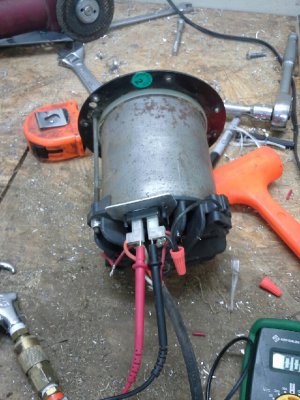Looking at the connections, it's probably a shunt-wound universal motor - these are the good ones as brushed motors go, the constant field voltage means they don't run away like series wound (or at least not as badly!) when unloaded but it's vital to have the field current flowing any time you power the armature! The Monarch 10EE used something similar (but much, much larger!) for its variable-speed drive, with field-failure relays (armature contacts open until field current flowed, to protect the motor) and field-weakening for the top end of the speed range. the field-failure relays put the field current through the relay coil, so the contacts for the armature current stayed open until field current flowed. Nice. Safe. The armature current/voltage controlled motor speed until it got to the top of the speed range, so the control electrics had a dual potentiometer to control both currents - I would guess they're pretty much unobtainable now?
It would probably run OK on AC too, given the right sort of voltages (probably a tad higher than the DC voltage, possibly even on 110v), the field failure could then be done using a low-voltage transformer with secondary rated for the field current it's passing and an AC relay coil driven from the 110v side...





